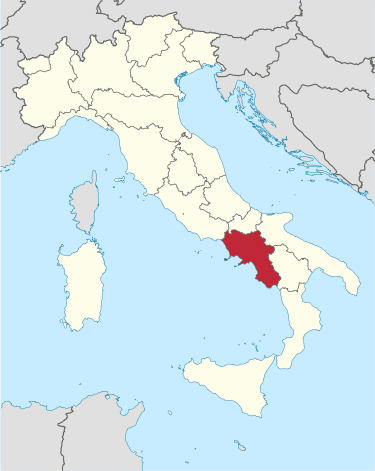
World renown for its stunning beauty, delicious food, long history and rich culture, Campania sightseeing offers plethora of Italy vacation opportunities. Above all its vibrant and lively people make this southern Italian region unique.
The area’s original inhabitants were Italic tribes including the Osci, the Aurunci, the Ausones, and later the Samnites.
Then by the 8th century B.C. the ancient Greeks settled around what is today Naples. At this time the area was part of the Magna Graecia. Later, around the 4th Century B.C, the Ancient Romans settled in the area.
Its long and diverse history, cultural mix, richness of its art, good food, and stunning beauty make Campania a fantastic Italy tour destination. For more information about planning a trip to southern Italy check out this Campania travel guide.
Table of contents
Campania Location

Campania is located in southern Italy on its west coast.
Campania is located in southern Italy. It is south of Rome and the region of Lazio. Set along the Mediterranean sea, Campania borders four Italian regions: to its north is Lazio, to its northeast is Molise, and to its east Puglia, and to its south east is Basilicata.
Campania’s largest city is Naples. the Naples cruise port is popular port of call to visit Pompeii and the Amalfi Coast.
Campania Sightseeing Video
For more information about Campania sightseeing and southern Italy vacations watch the video below.
Campania Travel Guide Map
Today the region of Campania includes five provinces: Avellino, Benevento, Caserta, Naples (the Capital), and Salerno.
Campania Sightseeing Highlights
Many travelers include Campania sightseeing on their southern Italy trip itinerary. Campania sightseeing includes exploring the art, culture, food, and history of Mediterranean civilizations. Campania’s beaches are also popular destinations.
Below is the Italiantourism.us Campania travel guide to the region’s highlights.
Amalfi
Amalfi is the ancient Maritime Republic after which the coast was named. The Arab-Sicilian cathedral of Sant’Andrea Apostolo – rebuilt in Baroque style in the 1700’s – with its marvelous flight of steps and charming cloister must be toured.
Amalfi Coast
The spectacular beauty of the Amalfi Coast and the Sorrentine peninsula is unmatched. Overlooking the Tyrrhenian Sea, the Amalfi Coast is set between Salerno and Sorrento.
The Amalfi Coast extends in the Gulf of Salerno and includes famous places, such as Amalfi, Furore, Positano, Ravello, Atrani, Minori, Praiano, Vietri Sul Mare. Small and hidden beaches, creating a unique and enthralling scenery, with little towns interlaced make it a simply beautiful southern Italy vacation destination.
Capri
A boat ride into the Bay of Naples brings vacationers to Isle of Capri, known for its spectacular beauty and vistas.
Many travelers are interested to visit the Blue Grotto. This hole in the side of the island reveals a cave that glows blue. To enter requires visiting at low tide so as to be able to enter comfortably.
Other sightseeing highlights on the Isle of Capri include Augustus Gardens, Faraligioni, and the town’s center. Above the center the high part of the island is called Anacapri, from which you’ll enjoy breathtaking views back to the Bay of Naples, Mt. Vesuvius, and the Amalfi Coast.
Caserta – Royal Palace
The Royal Palace at Caserta and its park was built in the 1700s by King Charles VII of Naples and Sicily, who became later Charles III of Spain. This royalty is known as the Bourbon kings of Naples. He also built the Royal Palace in Naples and the what is now the Capodimonte Museum in Naples.
Today the Royal Palace of Caserta is one of the 55 Italian UNESCO World Heritage Sites.
The palace is a triumph of the Italian Baroque and one of the most famous and important works by the Neapolitan architect Luigi Vanvitelli.
Everyday visitors are left enchanted by the beauty of its interiors and by the magnificence of its exterior. Highly-curated and pronounced in the details and design of its four monumental courtyards, the Palace is set amidst a beautiful park that today is the destination of thousands upon thousands of tourists.
The sumptuous palace is an ideal and harmonious fusion of two other royal residences: the Royal Palace at Versailles and the Escorial Palace in Madrid.
Click here for more information about visiting the Royal Palace of Caserta.
Herculaneum
Herculaneum was covered in mud from the Mt Vesuvius eruption in 79 AD. A famous excavation here uncovered fabulous artifacts from the ancient Romans. Throughout Herculaneum one can view rare and beautiful sculptures, mosaics and mural paintings.
Legend has it that Hercules founded Herculaneum, but in reality very little about this buried city (even if, ironically, its buildings are the best-preserved).
The Baths, along with the College of the Priests of Augustus and a theatre are all almost completely intact. The House of the Bicentenary and the House of Stags, both contain ample courtyards and are rich in decoration.
Herculaneum was a thriving commercial zone, and various jars and containers filled with foodstuffs survived the destruction and subsequent burial from the eruption.
Tours of Herculaneum are typically less crowded than Pompeii.
Mt Vesuvius
Volcano that looms over the Bay of Naples. Its picture perfect form masquerades its danger. Mt Vesuvius’ eruption in 79 AD covered Pompeii in its ash and Herculaneum in mud flows. Today grapes from its slopes produce delicious local wines.
Naples
Naples is one of the most vibrant cities in the world. Its origin dates back over 2000 years to when the ancient Greeks inhabited this area.
Built just off the slopes of Mt Vesuvius, the volcanoes imposing presence gives the city a sense of immediacy and fast pace.
Naples sightseeing highlights include important museums, fine Neapolitan food, and shopping. for these reasons and more, Naples ranks among one of the top Italy vacation destinations. Click for escorted Italy tours that include Naples.
Visit the ItalianTourism.us Naples travel guide for more information about planning a trip to this world class exciting city.
Paestum
Paestum is day trip worth taking to walk among the best preserved ancient Greek Doric Temples. This area is also where the Italian water buffalo milk is made into the world famous Buffalo Mozzarella.
Pompeii
Information about the origins of the city are uncertain. The oldest available traces date back to the 7th-6th Centuries BC. A mixed population of Etruscans, Greeks and other Italic peoples led to the city’s development.
After becoming a Roman colony in 80 BC, it was rebuilt and endowed with private and public buildings, especially during the rules of the Emperors Augustus and Tiberius, from 27 B.C. to 37 A.D.
In 62 A.D. a violent earthquake struck the Vesuvius area. In Pompeii, the reconstruction began immediately, but it took an unusually-long time due the extent of the damage. Seventeen years later, on August 24, 79 A.D., the sudden eruption of Vesuvius buried Pompeii with ashes and lapillus.
The buried city was rediscovered in the 16th Century, but it was only in 1748 that the exploration phase began, under the King of Naples Charles III of Bourbon.
Excavation continued systematically throughout the 19th Century up to the most recent excavations, restorations and enhancements of the ancient city, with the rediscovering of its exceptional architecture, sculptures, paintings and mosaics.
Visitors are drawn to the doomed ancient Roman city Pompeii to walk on its ancient Roman cobblestoned streets and see its ruins preserved by the volcanic ash.
Positano
Positano, a holiday resort since Roman times, is known for its white houses heading down towards the sea and surrounding the church of Santa Maria Assunta (its dome also has majolica tiles).
Its little alleyways are typical to southern Italy. Stroll among them stopping in at the little shops where local crafts can be purchased.
The flights of steps take people from the top part of town down to the beach. Among the most important beaches are Spiaggia Grande and Spiaggia di Fornillo, which can both be reached on foot; La Porta, Arienzo and San Pietro Laurito beaches can all be reached by boat.
Ravello
Ravello, an elegant and refined village, is characterized by luxurious villas. Set high above the sea, the heart of Ravello is represented by Piazza Vescovado, framed by the architecture of Palazzo Rufolo and the Cathedral with its magnificent portal (the first ever made with this innovative mold technique) and 10-feet-high bell tower. The gardens and panoramic viewpoints at Villa Rufolo and Villa Cimbrone are absolutely breathtaking.
Salerno
Salerno is an off-the-beaten path Italian city located right on the Mediterranean. To get a feel for it, take a stroll along the Lungomare Trieste seaside promenade and visit the medieval d’Arechi castle dominating Salerno from above.
Santa Maria di Castellabate
Popular beach town south of Salerno and the Amalfi Coast on the Cilento Coast.
The town is a part of “Cilento and Vallo di Diano National Park”. It attracts a lot of tourism, especially in summer, because of good road links to Agropoli, Salerno and Naples and because of the quality of its water; which give it the Blue Flag beach award.
Sorrento
Sorrento is a resort town. it is known as the city of citruses. Lemons and oranges grow on its terraced hills sloping down to the sea.
Sorrento is on the Gulf of Naples. Popular tours of Italy often include Sorrento on the itinerary. This resort town is ideal starting point to visit the Amalfi Coast, Naples, Herculaneum, Pompeii, Ischia and Capri. Furthermore, Caserta and Paestum are a day trip away.
Sorrento sits atop a bluff terrace 150 feet above the sea. It is surrounded by lush vegetation. The old town center still has ancient traces of Roman origin and is surrounded on one side by 16th-century walls. It is also home to the cathedral (rebuilt in the 15th century) and its Neo-Gothic façade, and the Church of St. Francis of Assisi, with a significant 14th-century cloister and Arab-style portico.
Visitors should also visit the Correale museum, take a stroll in the park where they will enjoy a magnificent view of the gulf, and take a tour of Punta del Capo, which is the location of the ruins of what is believed to be the villa of Pollio Felice (1st century AD).
Other points of interest along the Sorrento coast include Nerano, Marina del Cantone and Stabiae. The renowned Ieranto Bay is nice excursion from Sorrento. Located at the tip of the Sorrentine peninsula jutting out into the Mediterranean Sea. The bay can be reached by taking a path that starts out in Nerano. Here you can enjoy hiking trails while taking in the breathtaking views out to Capri.
Campania Food and Wine
The food in this area including the wine, olive oil, lemons, oranges, tomatoes, buffalo mozzarella all contribute to make Campania sightseeing a highlight of any Italy vacation.
The volcano Mt. Vesuvius majestically towers over this breathtaking area. It contributes essential nutrients to the area’s soil. This makes the local fruits and vegetables rich in taste, size and aroma.
The Campania region’s cuisine is known for its pizza, cheeses, pastas, fresh vegetables, seafood, and of course limoncello.
Italy Tours that include Campania
The following tours of Italy include Campania destinations on the itinerary.
For more information about southern Italy vacations that visit the region of Campania check out following pages:
For more information about touring Italy check out our Italy travel guide.
Campania Travel Facts
Campania located in southern Italy enchants all the senses. Its natural beauty pleases the eyes. Hillsides brimming with citrus fill the air with sweet aromas. The fast-paced Naples tingles the ears. Slow-paced Amalfi Coast, Capri and Ischia are made for relaxation while soaking up the sun. For more information about touring Campania check out ItalianTourism.us Italy tours that include Campania.
Campania is located in southern Italy. It is about 140 miles south of Rome. Its borders include Lazio to its north, the region where Rome is located, south is a tiny strip of Basilicata and Calabria. To its east are Molise and Puglia.
Campania’s main airport is Naples International Airport, also known as Capodichino Airport (NAP). Naples and Salerno are the region’s main train stations. Fast train between Rome Termini and Naples Centrale is 1 hour and 20 minutes. Most trains take about 2 hours. The fast train between Rome Termini and Salerno is 1 hour and 30 minutes.
Campania is famous for many things among them: Mt Vesuvius, which explosion in 79AD covered Pompeii, Herculaneum and other ancient Roman cities in its ash. Campania is known for its pizza, with the renown buffalo mozzarella being a local product produced in Paestum and shipped worldwide. Also in Paestum tourists visit the ancient Greek Doric Temples, still standing and among the best-preserved Greek Temples in the world. Moreover, Campania is know for its coastline, such as the Amalfi Coast, and its three popular islands Capri, Ischia and Procida. Located in Caserta, the Royal Palace of Caserta draws many tourists to walk in its garden and savor its opulence. Finally, Campania is known for its largest city Naples.
Campania’s islands and the Amalfi Coast are primarily spring, summer and fall destinations. Naples is also a popular Italy Christmas vacation destination.
The provinces of Campania are: Naples (the regional capital), Caserta, Benevento, Avellino and Salerno.
The natural beauty and food of Campania conspire to woo all who visit. Moreover, Naples, Capri, the Amalfi Coast, and Pompeii are among three of the most popular destinations in Italy. Lesser known is Paestum where its ancient Greek Doric Temples are among the finest in the world.



